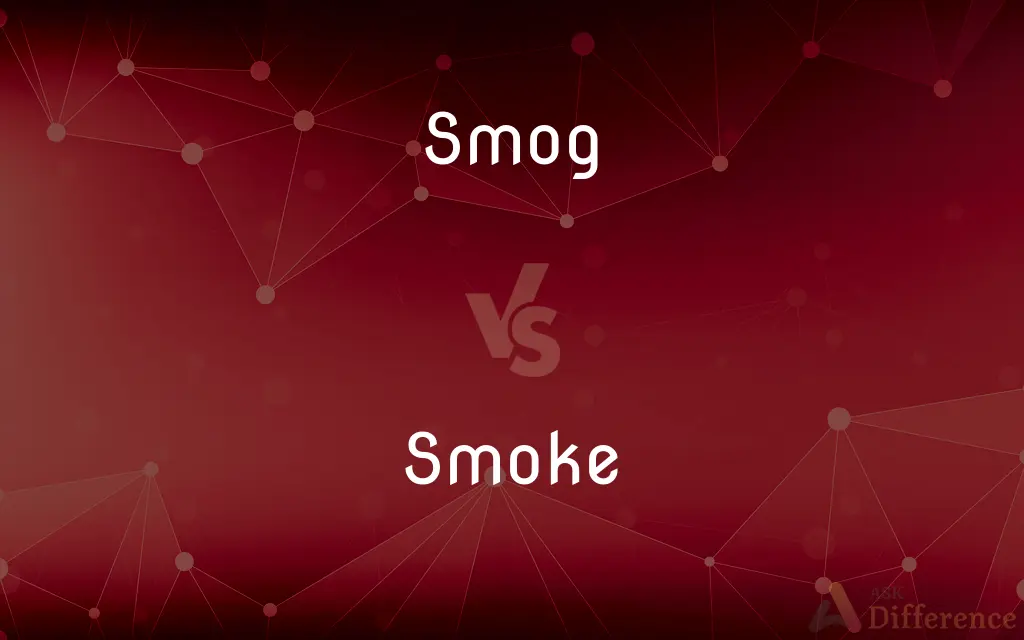Smog vs. Smoke — What's the Difference?
Edited by Tayyaba Rehman — By Fiza Rafique — Updated on March 14, 2024
Smog is a type of air pollution combining smoke, gases, and other pollutants, often resulting from industrial and vehicle emissions. Smoke is a visible collection of particles and gases produced by combustion, typically emitting from fires.

Difference Between Smog and Smoke
Table of Contents
ADVERTISEMENT
Key Differences
Smog originates from a mix of pollutants, including vehicle exhaust, industrial emissions, and chemical reactions in the atmosphere, particularly in urban areas. It's characterized by a hazy appearance that can reduce visibility and harm air quality. Smoke, in contrast, is a direct byproduct of combustion, resulting from materials like wood, fossil fuels, or other substances burning, and it's identified by its distinct smell and the presence of particulate matter.
The term "smog" was initially coined to describe the mixture of smoke and fog in industrial areas, signifying its close relationship with urban and industrial activities. Smoke, however, is more universally encountered and can result from natural events like wildfires, household activities like cooking, or industrial processes.
Health implications of smog include respiratory issues, eye irritation, and exacerbation of heart and lung diseases, influenced by its complex mixture of pollutants. Smoke primarily impacts health through inhalation of particulate matter and toxic compounds, which can irritate the respiratory system and worsen chronic heart and lung conditions.
While both smog and smoke contribute to air pollution and can have detrimental health effects, smog is more associated with urban environments and a broader range of chemical constituents. In contrast, smoke is more singularly associated with the act of combustion and is present in both urban and rural settings.
Management and reduction strategies for smog often involve regulatory measures targeting emissions from vehicles and industries, promoting cleaner energy sources, and improving urban planning. For smoke, especially from wildfires, strategies include controlled burns, forest management, and, for household smoke, using cleaner fuels and technologies for heating and cooking.
ADVERTISEMENT
Comparison Chart
Composition
Mixture of pollutants, including gases and particulate matter
Particulate matter and gases from combustion
Source
Industrial and vehicle emissions, chemical reactions
Combustion of materials like wood, fossil fuels
Visibility
Hazy appearance, reduces visibility
Visible, can vary in color from white to black
Health Impact
Respiratory issues, eye irritation, heart and lung diseases
Respiratory irritation, exacerbated chronic conditions
Associated Environment
Primarily urban environments
Both urban and rural, depending on the source
Compare with Definitions
Smog
It consists of a complex mixture of air pollutants that can vary in composition.
The smog today is particularly dense, containing a mix of ozone, particulate matter, and nitrogen oxides.
Smoke
Smoke arises from the burning of various materials, emitting a mixture of gases and solid particles.
The campfire produced a thick smoke that lingered in the evening air.
Smog
Smog is a significant problem in urban areas with high levels of industrial activity and traffic.
The city was enveloped in a thick layer of smog due to heavy traffic and industrial emissions.
Smoke
Smoke is often recognized by its distinctive smell and can vary in color depending on the material being burned.
The dark, acrid smoke from the burning tires was noticeable from a distance.
Smog
Smog often leads to reduced visibility, affecting transportation and outdoor activities.
The heavy smog caused flight delays and made driving conditions hazardous.
Smoke
It can come from natural sources like wildfires or human activities such as burning fossil fuels.
Wildfires in the region have been a major source of smoke, affecting air quality miles away.
Smog
Prolonged exposure to smog can lead to serious health problems, including respiratory and cardiovascular diseases.
Living in areas with frequent smog alerts has been linked to higher rates of asthma and heart attacks.
Smoke
Inhaling smoke can lead to respiratory problems and exacerbate pre-existing health conditions.
The dense smoke from the forest fire caused many residents to suffer from severe coughing and breathing difficulties.
Smog
Measures to control smog include reducing vehicle emissions, using cleaner energy, and improving industrial practices.
The government introduced stricter emission standards to combat the worsening smog conditions.
Smoke
Managing smoke involves fire prevention and control, using cleaner cooking and heating methods, and forest management.
To reduce household smoke exposure, many communities are adopting cleaner cookstove technologies.
Smog
A form of air pollution produced by the photochemical reaction of sunlight with hydrocarbons and nitrogen oxides that have been released into the atmosphere, especially by automotive emissions.
Smoke
Emit a cloud of fine particles;
The chimney was fuming
Smog
Smoke fog, or smog for short, is a type of intense air pollution. The word "smog" was coined in the early 20th century, and is a contraction (portmanteau) of the words smoke and fog to refer to smoky fog due to its opacity, and odor.
Smoke
Smoke is a collection of airborne particulates and gases emitted when a material undergoes combustion or pyrolysis, together with the quantity of air that is entrained or otherwise mixed into the mass. It is commonly an unwanted by-product of fires (including stoves, candles, internal combustion engines, oil lamps, and fireplaces), but may also be used for pest control (fumigation), communication (smoke signals), defensive and offensive capabilities in the military (smoke screen), cooking, or smoking (tobacco, cannabis, etc.).
Smog
Fog that has become mixed and polluted with smoke.
Smoke
A visible suspension of carbon or other particles in air, typically one emitted from a burning substance
Bonfire smoke
Smog
A noxious mixture of particulates and gases that is the result of urban air pollution.
Smoke
An act of smoking tobacco
I'm dying for a smoke
Smog
(informal) To get a smog check; to check a vehicle or have it checked for emissions.
If the car is more than five years old, you'll have to have it smogged before you can register it.
Smoke
A big city, especially London
She was offered a job in the Smoke
Smog
Air pollution by a mixture of smoke and fog
Smoke
Emit smoke or visible vapour
Heat the oil until it just smokes
Smoke
Inhale and exhale the smoke of tobacco or a drug
Janine was sitting at the kitchen table smoking
He smoked forty cigarettes a day
Smoke
Treat, fumigate, or cleanse by exposure to smoke.
Smoke
Make fun of (someone)
We baited her and smoked her
Smoke
A mixture of gases and small suspended particles of soot or other solids, resulting from the burning of materials such as wood or coal.
Smoke
A cloud of such gases and suspended particles.
Smoke
A vapor, mist, or fume that resembles this.
Smoke
Something insubstantial, unreal, or transitory
"What everybody echoes or in silence passes by as true to-day may turn out to be falsehood to-morrow, mere smoke of opinion" (Henry David Thoreau).
Smoke
The act of smoking a form of tobacco
Went out for a smoke.
Smoke
The duration of this act.
Smoke
(Informal) Tobacco in a form that can be smoked, especially a cigarette
Money to buy smokes.
Smoke
A substance used in warfare to produce a smokescreen.
Smoke
Something used to conceal or obscure.
Smoke
A pale to grayish blue to bluish or dark gray.
Smoke
(Baseball) Pitches thrown at high velocity; fast balls
Threw a lot of smoke in the early innings.
Smoke
To draw in and exhale smoke from a cigarette, cigar, or pipe
It's forbidden to smoke here.
Smoke
To engage in smoking regularly or habitually
He smoked for years before stopping.
Smoke
To emit smoke or a smokelike substance
Chimneys smoking in the cold air.
Smoke
To emit smoke excessively
The station wagon smoked even after the tune-up.
Smoke
To go or proceed at high speed.
Smoke
To play or perform energetically
The band was really smoking in the second set.
Smoke
To draw in and exhale the smoke of (tobacco, for example)
I've never smoked a panatela.
Smoke
To do so regularly or habitually
I used to smoke filtered cigarettes.
Smoke
To preserve (meat or fish) by exposure to the aromatic smoke of burning hardwood, usually after pickling in salt or brine.
Smoke
To fumigate (a house, for example).
Smoke
To expose (animals, especially insects) to smoke in order to immobilize or drive away.
Smoke
To expose (glass) to smoke in order to darken or change its color.
Smoke
To defeat decisively, as in a competition.
Smoke
(Baseball) To throw (a pitch) at high velocity.
Smoke
(uncountable) The visible vapor/vapour, gases, and fine particles given off by burning or smoldering material.
Smoke
A cigarette.
Can I bum a smoke off you?;
I need to go buy some smokes.
Smoke
Anything to smoke (e.g. cigarettes, marijuana, etc.)
Hey, you got some smoke?
Smoke
An instance of smoking a cigarette, cigar, etc.; the duration of this act.
I'm going out for a smoke.
Smoke
A fleeting illusion; something insubstantial, evanescent, unreal, transitory, or without result.
The excitement behind the new candidate proved to be smoke.
Smoke
Something used to obscure or conceal; an obscuring condition; see also smoke and mirrors.
The smoke of controversy.
Smoke
(uncountable) A light grey colour/color tinted with blue.
Smoke
Bother; problems; hassle.
You better not be giving me no smoke.
Smoke
A particulate of solid or liquid particles dispersed into the air on the battlefield to degrade enemy ground or for aerial observation. Smoke has many uses--screening smoke, signaling smoke, smoke curtain, smoke haze, and smoke deception. Thus it is an artificial aerosol.
Smoke
A fastball.
Smoke
(countable) A distinct column of smoke, such as indicating a burning area or fire.
Smoke
(transitive) To inhale and exhale the smoke from a burning cigarette, cigar, pipe, etc.
Smoke
(intransitive) To inhale and exhale tobacco smoke.
Do you smoke?
Smoke
(intransitive) To give off smoke.
My old truck was still smoking even after the repairs.
Smoke
(intransitive) Of a fire in a fireplace: to emit smoke outward instead of up the chimney, owing to imperfect draught.
Smoke
(transitive) To preserve or prepare (food) for consumption by treating with smoke.
You'll need to smoke the meat for several hours.
Smoke
(transitive) To dry or medicate by smoke.
Smoke
To fill or scent with smoke; hence, to fill with incense; to perfume.
Smoke
To make unclear or blurry.
Smoke
To perform (e.g. music) energetically or skillfully.
The horn section was really smokin' on that last tune.
Smoke
To beat someone at something.
We smoked them at rugby.
Smoke
To thrash; to beat.
Smoke
To smell out; to hunt out; to find out; to detect.
Smoke
To ridicule to the face; to mock.
Smoke
To burn; to be kindled; to rage.
Smoke
To raise a dust or smoke by rapid motion.
Smoke
To suffer severely; to be punished.
Smoke
To punish (a person) for a minor offense by excessive physical exercise.
Smoke
(transitive) To cover (a key blank) with soot or carbon to aid in seeing the marks made by impressioning.
Smoke
The visible exhalation, vapor, or substance that escapes, or expelled, from a burning body, especially from burning vegetable matter, as wood, coal, peat, or the like.
Smoke
That which resembles smoke; a vapor; a mist.
Smoke
Anything unsubstantial, as idle talk.
Smoke
The act of smoking, esp. of smoking tobacco; as, to have a smoke.
Smoke
To emit smoke; to throw off volatile matter in the form of vapor or exhalation; to reek.
Hard by a cottage chimney smokes.
Smoke
Hence, to burn; to be kindled; to rage.
The anger of the Lord and his jealousy shall smoke agains. that man.
Smoke
To raise a dust or smoke by rapid motion.
Proud of his steeds, he smokes along the field.
Smoke
To draw into the mouth the smoke of tobacco burning in a pipe or in the form of a cigar, cigarette, etc.; to habitually use tobacco in this manner.
Smoke
To suffer severely; to be punished.
Some of you shall smoke for it in Rome.
Smoke
To apply smoke to; to hang in smoke; to disinfect, to cure, etc., by smoke; as, to smoke or fumigate infected clothing; to smoke beef or hams for preservation.
Smoke
To fill or scent with smoke; hence, to fill with incense; to perfume.
Smoke
To smell out; to hunt out; to find out; to detect.
I aloneSmoked his true person, talked with him.
He was first smoked by the old Lord Lafeu.
Upon that . . . I began to smoke that they were a parcel of mummers.
Smoke
To ridicule to the face; to quiz.
Smoke
To inhale and puff out the smoke of, as tobacco; to burn or use in smoking; as, to smoke a pipe or a cigar.
Smoke
To subject to the operation of smoke, for the purpose of annoying or driving out; - often with out; as, to smoke a woodchuck out of his burrow.
Smoke
A cloud of fine particles suspended in a gas
Smoke
A hot vapor containing fine particles of carbon being produced by combustion;
The fire produced a tower of black smoke that could be seen for miles
Smoke
An indication of some hidden activity;
With all that smoke there must be a fire somewhere
Smoke
Something with no concrete substance;
His dreams all turned to smoke
It was just smoke and mirrors
Smoke
Tobacco leaves that have been made into a cylinder
Smoke
Street names for marijuana
Smoke
The act of smoking tobacco or other substances;
He went outside for a smoke
Smoking stinks
Smoke
(baseball) a pitch thrown with maximum velocity;
He swung late on the fastball
He showed batters nothing but smoke
Smoke
Inhale and exhale smoke from cigarettes, cigars, pipes;
We never smoked marijuana
Do you smoke?
Common Curiosities
What is the primary cause of smog?
The primary causes of smog are industrial and vehicle emissions that react under sunlight, especially in urban areas.
How do weather conditions affect smog and smoke?
Weather conditions greatly affect the dispersion and concentration of both smog and smoke. For instance, temperature inversions can trap smog close to the ground, and wind can spread smoke over large areas.
Can smoke contribute to the formation of smog?
Yes, smoke from fires can contribute to smog formation, especially when mixed with industrial pollutants and under certain weather conditions.
How can individuals protect themselves from smog and smoke?
Individuals can protect themselves by staying indoors on high pollution days, using air purifiers, wearing masks, and reducing exposure to known sources of smoke and smog.
Can smog and smoke affect climate change?
Yes, both smog and smoke can impact climate change. Certain components of smog, like ozone, are greenhouse gases, while smoke particles can affect cloud formation and weather patterns.
What measures can cities take to reduce smog?
Cities can reduce smog through measures like improving public transportation, encouraging electric vehicle use, implementing stricter industrial emissions standards, and promoting green spaces.
Are there different types of smog?
Yes, there are primarily two types: "sulfurous smog," resulting from a high concentration of sulfur oxides, and "photochemical smog," which is caused by the reaction of sunlight with pollutants like nitrogen oxides and volatile organic compounds.
How can wildfires be managed to reduce smoke pollution?
Wildfire smoke can be managed through controlled burns, effective forest management, and rapid response to wildfires to minimize their size and duration, thereby reducing smoke production.
How does smog differ in winter compared to summer?
Winter smog is often characterized by higher concentrations of sulfurous smog due to increased heating emissions, whereas summer smog is more associated with photochemical smog from increased sunlight and vehicle emissions.
What role do trees and plants play in reducing smog and smoke?
Trees and plants can help reduce smog and smoke by absorbing pollutants and particulate matter, though their ability to significantly cleanse the air depends on the scale of pollution and the types of plants.
Share Your Discovery

Previous Comparison
Volcano vs. Vulcan
Next Comparison
Irish vs. GaelicAuthor Spotlight
Written by
Fiza RafiqueFiza Rafique is a skilled content writer at AskDifference.com, where she meticulously refines and enhances written pieces. Drawing from her vast editorial expertise, Fiza ensures clarity, accuracy, and precision in every article. Passionate about language, she continually seeks to elevate the quality of content for readers worldwide.
Edited by
Tayyaba RehmanTayyaba Rehman is a distinguished writer, currently serving as a primary contributor to askdifference.com. As a researcher in semantics and etymology, Tayyaba's passion for the complexity of languages and their distinctions has found a perfect home on the platform. Tayyaba delves into the intricacies of language, distinguishing between commonly confused words and phrases, thereby providing clarity for readers worldwide.













































